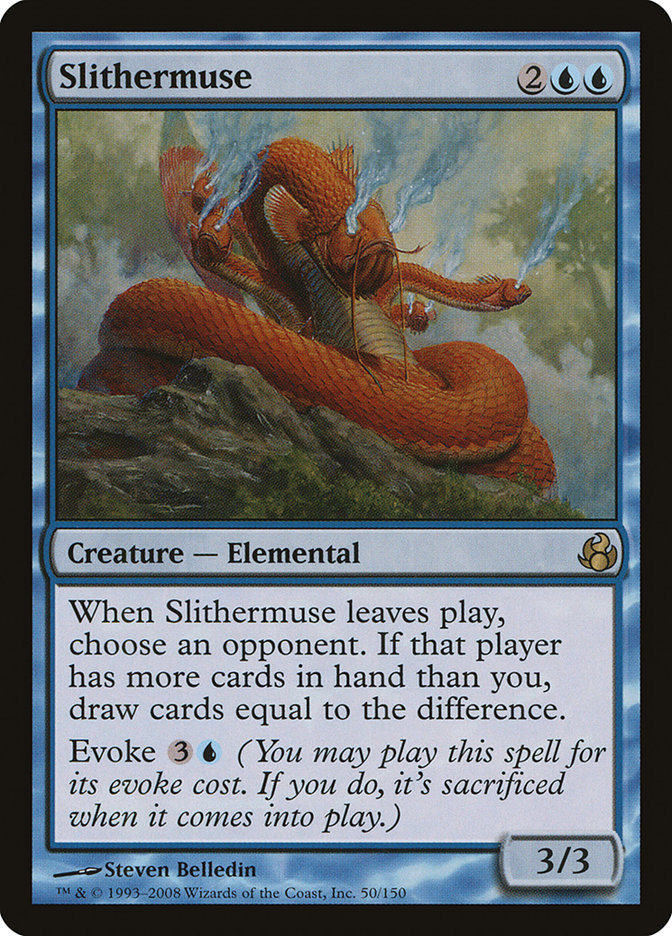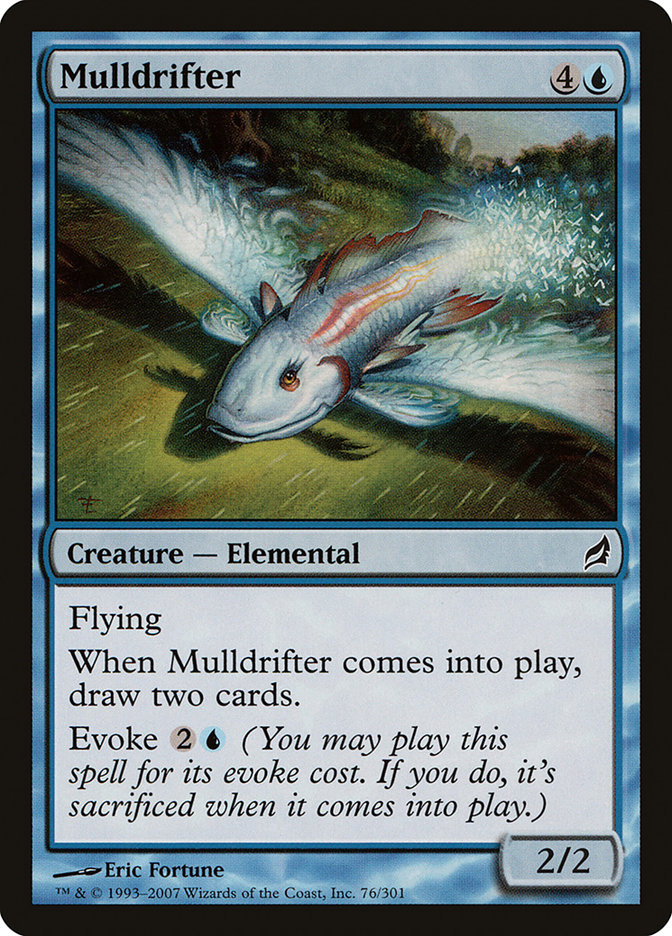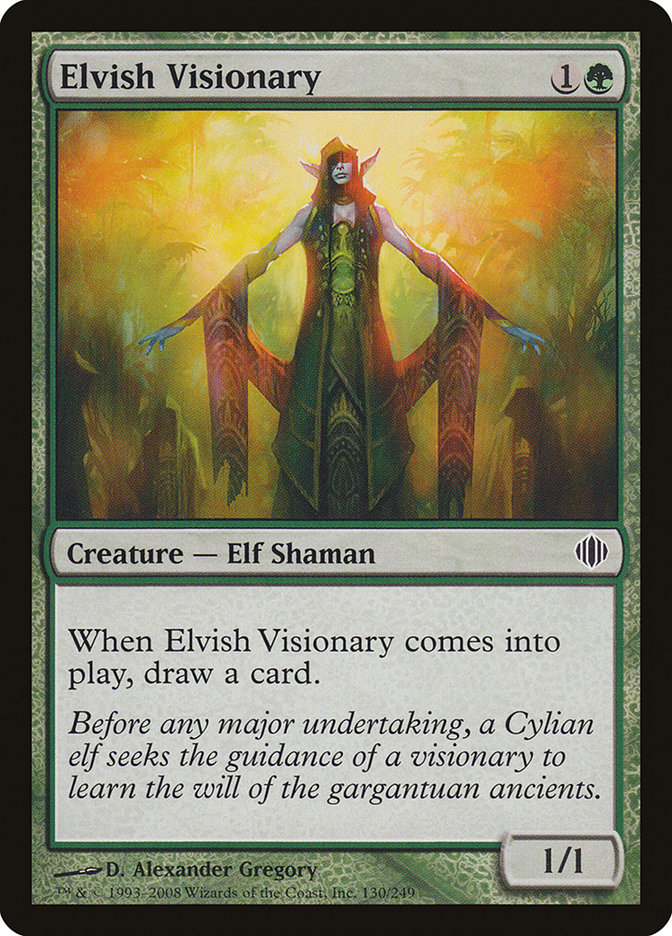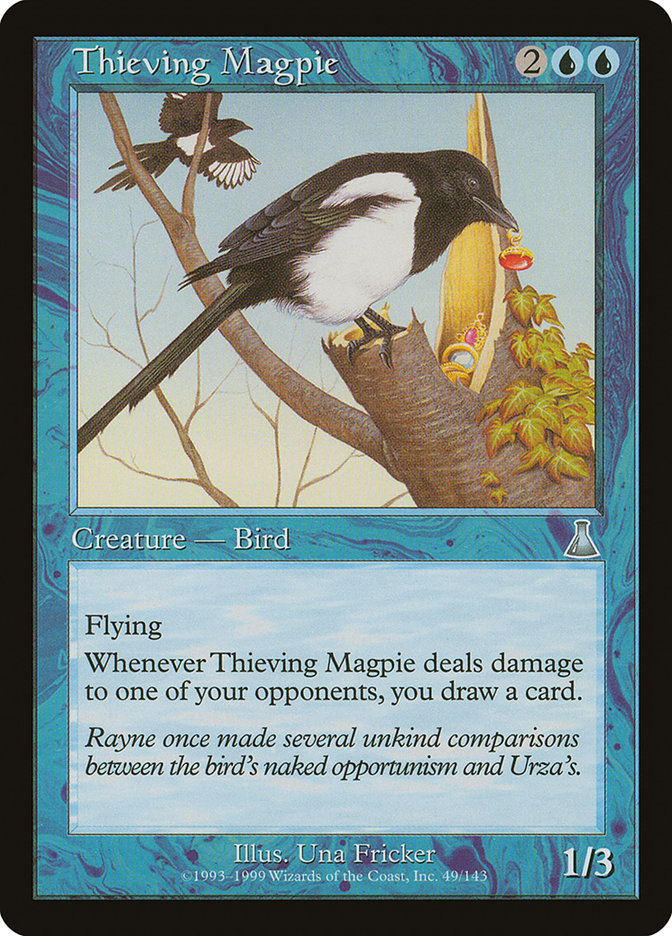Musa escurridiza Carta MTG
| El coste de maná | |
| Costo de maná convertido | 4 |
| Rareza | Extraña |
| Tipo | Criatura — Elemental |
| Habilidades | Evoke |
| Liberado | 2008-02-01 |
| Coleccione símbolo | |
| Coleccione nombre | Morningtide |
| Coleccione código | MOR |
| Fuerza | 3 |
| Tenacidad | 3 |
| Número | 50 |
| Frame | 2003 |
| Disposición | Normal |
| Border | Negra |
| Ilustrado por | Steven Belledin |
Texto de la carta
Cuando la Musa escurridiza deje el juego, elige un oponente. Si ese jugador tiene más cartas en la mano que tú, roba una cantidad de cartas igual a la diferencia. Evocar {3}{U}. (Puedes jugar este hechizo por su coste de evocar. Si lo haces, sacrifícalo cuando entre en juego.)
Cartas Similares
Slithermuse es una entrada única en el panteón de cartas de criatura dentro de Magic: The Gathering. Al igual que sus contemporáneas, se centra en el tema de robar cartas cuando abandona el campo de batalla. Cartas como Mulldrifter también ofrecen utilidad de robo de cartas, con una habilidad de evocación que permite a los jugadores robar dos cartas. Sin embargo, Slithermuse puede potencialmente obtener más cartas, dependiendo del número de cartas en la mano del oponente, lo que puede crear un cambio significativo en la dinámica del juego.
Otro par en esta comparación es Elvish Visionary. Si bien asegura una carta al entrar en el campo de batalla y es notablemente menos condicional que Slithermuse, no tiene el mismo potencial para robar múltiples cartas. En contraste, al observar criaturas con efectos similares de abandonar el campo de batalla, destaca Thieving Magpie pero requiere daño a un oponente para robar una sola carta, lo que lo hace menos confiable que la salida a veces predecible de Slithermuse.
En última instancia, Slithermuse puede ser una fuerza poderosa en el escenario adecuado, remodelando el estado de tu mano, especialmente cuando se combina con efectos de sacrificio o de parpadeo. Su capacidad para capitalizar la ventaja de cartas del oponente lo convierte en una opción intrigante para los jugadores que buscan maximizar su potencial de robo de una sola criatura.
Aspectos Positivos de la Carta
Ventaja de Cartas: Cuando Slithermuse abandona el campo de batalla, su efecto potencialmente rellena tu mano robando cartas igual al número de cartas en la mano del oponente, lo que puede cambiar drásticamente el equilibrio a tu favor.
Aceleración de Recursos: Esta criatura puede actuar como una forma de aceleración de recursos al permitirte maximizar el uso de tu maná. Aunque no genera directamente maná o fichas, tener una mano llena de cartas puede significar más jugadas y un desarrollo más rápido de tu estado de mesa.
Velocidad Instantánea: Aunque Slithermuse en sí no es un instantáneo, su coste de Invocar puede pagarse a velocidad instantánea. Esto permite un cronometraje estratégico, especialmente cuando buscas maximizar la cantidad de cartas que te permitirá robar durante el paso final del oponente.
Aspectos Negativos de la Carta
Requisito de Descarte: Slithermuse te pide renunciar a una criatura de valor cuando abandona el campo de batalla para realizar su ventaja potencial de cartas, lo que podría no alinearse con tu estilo de juego o estrategia, especialmente cuando los recursos son escasos.
Coste de Maná Específico: Con un coste de lanzamiento que incluye maná genérico y azul, Slithermuse exige un mazo adaptado a estos requisitos de color, limitando potencialmente su adopción en mazos que no favorecen el maná azul o la adaptabilidad multicolor.
Coste de Maná Comparativamente Alto: A pesar de ofrecer una interesante ventaja de cartas basada en el tamaño de la mano de los oponentes, Slithermuse tiene un coste de maná bastante alto para un efecto que no tiene un impacto inmediato a menos que esté abandonando el campo de batalla, lo que lo convierte en una opción menos óptima en un meta de ritmo rápido donde criaturas de menor coste pueden proporcionar valor de inmediato.
Razones para Incluir en tu Colección
Versatilidad: Slithermuse es una criatura única que puede integrarse fácilmente en mazos que estrategizan en torno a la manipulación de cementerios o tácticas de retorno de criaturas, ofreciendo un grado sorprendente de flexibilidad.
Potencial de Combo: Con su capacidad de rellenar tu mano al abandonar el campo de batalla, Slithermuse se combina bien con salidas de sacrificios y hechizos de reanimación, pudiendo iniciar jugadas poderosas que pueden abrumar a los oponentes.
Relevancia en el Meta: En un entorno rico en estrategias basadas en criaturas, la presencia de Slithermuse puede disuadir a los oponentes de extenderse demasiado, convirtiéndola en una adición estratégica para interrumpir la presencia de las criaturas del oponente.
Cómo vencerlo
Slithermuse es una carta de criatura única en Magic: The Gathering que puede representar un desafío en el mazo adecuado. Cuando abandona el campo de batalla, tu oponente podría rellenar su mano, robando cartas igual a la diferencia entre su mano y el número de cartas en tu mano. Esta habilidad hace importante manejar cuidadosamente el tamaño de las manos cuando te enfrentas a esta criatura elusiva.
Una estrategia efectiva para contrarrestar a Slithermuse es mantener la ventaja o paridad de cartas. Al mantener el número de cartas en tu mano en un nivel similar al de tu oponente, puedes minimizar el impacto de la habilidad activada de Slithermuse. Los hechizos de eliminación a velocidad instantánea pueden ser particularmente útiles, permitiéndote responder a la amenaza de que Slithermuse sea sacrificado o abandone el campo de batalla de otras formas, potencialmente cuando tu oponente tenga una mano más llena, para limitar su ventaja de robo de cartas.
Además, tener mecanismos de control de cementerio en tu mazo puede mitigar las consecuencias de la habilidad de llamada al abandonar el campo de batalla de Slithermuse. Las cartas que exilian desde el cementerio o impiden que las cartas vayan allí en primer lugar pueden ser invaluables. Al abordar a Slithermuse de manera efectiva, aseguras que la balanza de la ventaja de cartas no se incline demasiado en favor de tu oponente, manteniendo el juego en equilibrio y preservando tu camino hacia la victoria.
Donde comprar
Si estás buscando comprar una carta MTG Musa escurridiza de un coleccione específico como Morningtide, existen varias opciones confiables que debes considerar. Una de las fuentes principales es tu tienda de juegos local, donde a menudo puedes encontrar paquetes de refuerzo, cartas individuales y mazos preconstruidos de colecciones actuales y pasadas. A menudo ofrecen el beneficio adicional de una comunidad donde puedes intercambiar con otros jugadores.
Para un inventario más amplio, particularmente de colecciones más antiguos, mercados en línea como TCGPlayer, Card Kingdom y Card Market ofrecen amplias selecciones y te permiten buscar cartas de colecciones específicos. Las plataformas de comercio electrónico más grandes como eBay y Amazon también tienen listados de varios vendedores, lo que puede ser un buen lugar para buscar productos sellados y hallazgos raros.
Además, el sitio oficial de Magic suele tener un localizador de tiendas y listas de minoristas para encontrar Wizards of the Productos con licencia costera. Recuerde comprobar la autenticidad y el estado de las cartas al comprarlas, especialmente a vendedores individuales en mercados más grandes.
A continuación se muestra una lista de algunos sitios web de tiendas donde puede comprar las Musa escurridiza y otras cartas MTG:
 COMPRAR
COMPRAR BurnMana es un socio oficial de TCGPlayer
- eBay
- Card Kingdom
- Card Market
- Star City Games
- CoolStuffInc
- MTG Mint Card
- Hareruya
- Troll and Toad
- ABU Games
- Card Hoarder Magic Online
- MTGO Traders Magic Online
Ver productos MTG
Legalidades
Formatos de Magic the Gathering donde Musa escurridiza tiene restricciones
| Formato | Legalidad |
|---|---|
| Commander | Legal |
| Legacy | Legal |
| Modern | Legal |
| Oathbreaker | Legal |
| Vintage | Legal |
| Duel | Legal |
| Predh | Legal |
| Penny | Legal |
Reglas e información
La guía de referencia para las reglas de las cartas Musa escurridiza de Magic: The Gathering proporciona las reglas oficiales, las erratas emitidas, así como un registro de todas las modificaciones funcionales que se han producido.
| Fecha | Texto |
|---|---|
| 01/04/2008 | Los efectos que te hagan pagar más o menos por lanzar un hechizo también te harán pagar esa cantidad más o menos al lanzarlo por su coste de evocar. Esto se debe a que afectan al coste total del hechizo, no a su coste de mana. |
| 01/04/2008 | Evoke no cambia el momento en que puedes lanzar la criatura que la tiene. Si solo pudieras lanzar ese conjuro de criatura cuando pudieras lanzar un conjuro de conjuro, lo mismo es cierto para lanzarlo con evoke. |
| 01/04/2008 | Si un hechizo de criatura lanzado con evocar cambia de controlador antes de entrar al campo de batalla, aún será sacrificado cuando entre al campo de batalla. De manera similar, si una criatura lanzada con evocar cambia de controlador después de entrar al campo de batalla pero antes de que se resuelva su habilidad de sacrificio, aún será sacrificada. En ambos casos, el controlador de la criatura en el momento en que dejó el campo de batalla controlará su habilidad de dejar el campo de batalla. |
| 01/04/2008 | Si estás lanzando un hechizo "sin pagar su coste de maná", no puedes usar su habilidad de evocar. |
| 01/04/2008 | Cuando lanzas un hechizo pagando su coste de evocar, su coste de maná no cambia. Simplemente pagas el coste de evocar en su lugar. |
| 01/04/2008 | La capacidad de sacrificio de la invocación se activa cuando la criatura entra al campo de batalla dependiendo de si el controlador del hechizo eligió pagar el coste de invocación, no de si realmente lo pagaron (si fue reducido o alterado de alguna otra manera por otra habilidad, por ejemplo). |
| 01/04/2008 | Eliges un oponente cuando la habilidad se resuelva. Una vez que determines cuántas cartas más que tú tiene ese jugador, ese número queda fijo como la cantidad que robarás. |



